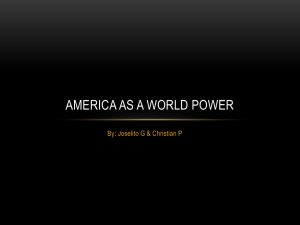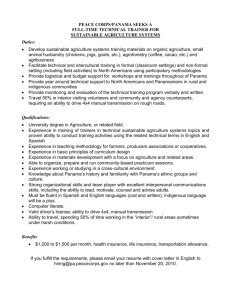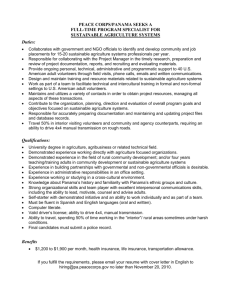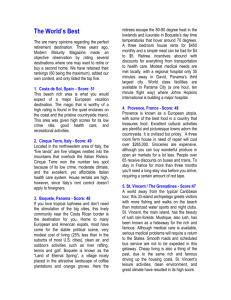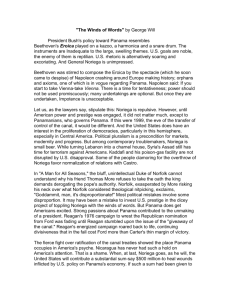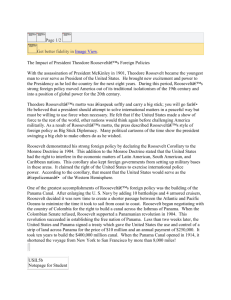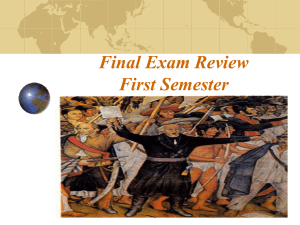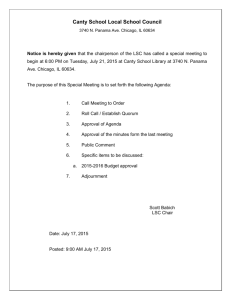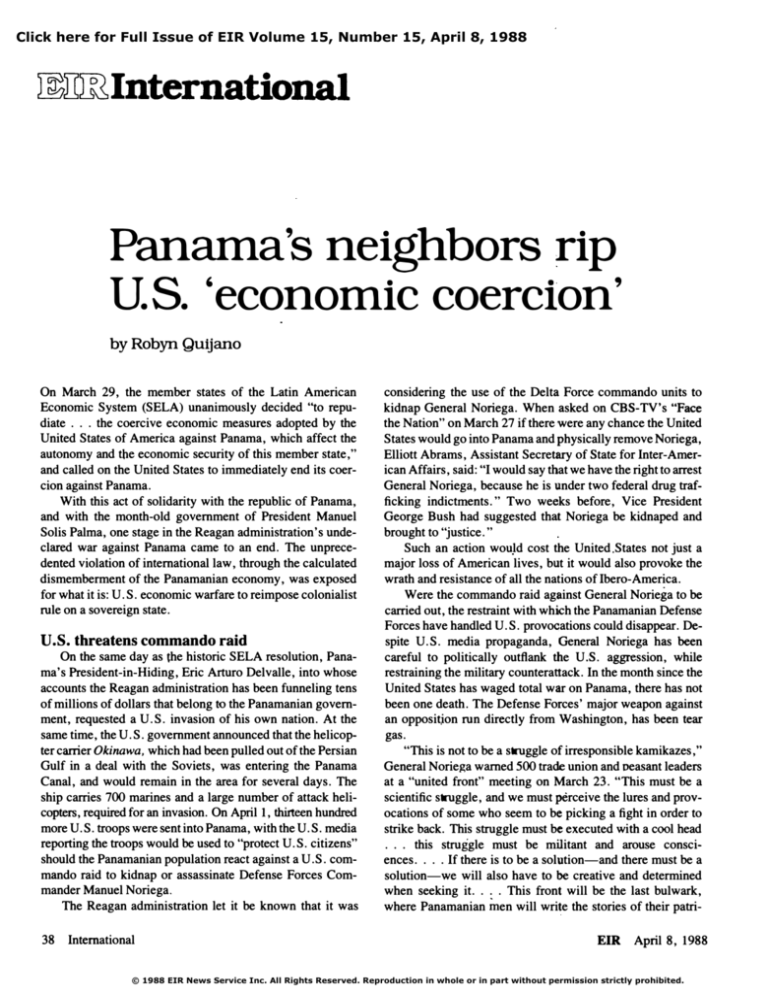
Click here for Full Issue of EIR Volume 15, Number 15, April 8, 1988
Panama's neighbors rip
U.S. 'economic coercion'
by Robyn Quijano
On March 29, the member states of the Latin American
Economic System (SELA) unanimously decided "to repu­
diate . . . the coercive economic measures adopted by the
United States of America against Panama, which affect the
autonomy and the economic security of this member state, "
and called on the United States to immediately end its coer­
cion against Panama.
With this act of solidarity with the republic of Panama,
and with the month-old government of President Manuel
Solis Palma, one stage in the Reagan administration's unde­
clared war against Panama came to an end. The unprece­
dented violation of international law, through the calculated
dismemberment of the Panamanian economy, was exposed
for what it is: U.S. economic warfare to reimpose colonialist
rule on a sovereign state.
U.S. threatens commando raid
On the same day as the historic SELA resolution, Pana­
ma's President-in-Hiding, Eric Arturo Delvalle, into whose
accounts the Reagan administration has been funneling tens
of millions of dollars that belong to the Panamanian govern­
ment, requested a U.S. invasion of his own nation. At the
same time, the U.S. government announced that the helicop­
ter carrier Okinawa, which had been pulled out of the Persian
Gulf in a deal with the Soviets, was entering the Panama
Canal, and would remain in the area for several days. The
ship carries 700 marines and a large number of attack heli­
copters, required for an invasion. On April 1, thirteen hundred
more U.S. troops were sent into Panama, with the U.S. media
reporting the troops would be used to "protect U.S. citizens"
should the Panamanian population react against a U.S. com­
mando raid to kidnap or assassinate Defense Forces Com­
mander Manuel Noriega.
The Reagan administration let it be known that it was
38
International
considering the use of the Delta Force commando units to
kidnap General Noriega. When asked on CBS-TV's "Face
the Nation" on March 27 if there were any chance the United
States would go into Panama and physically remove Noriega,
Elliott Abrams, Assistant Secretary of State for Inter-Amer­
ican Affairs, said: "I would say that we have the right to arrest
General Noriega, because he is under two federal drug traf­
ficking indictments." Two weeks before, Vice President
George Bush had suggested that Noriega be kidnaped and
brought to "justice."
Such an action would cost the United.States not just a
major loss of American lives, but it would also provoke the
wrath and resistance of all the nations of Ibero-America.
Were the commando raid against General Noriega to be
carried out, the restraint with which the Panamanian Defense
Forces have handled U.S. provoqations could disappear. De­
spite U.S. media propaganda, General Noriega has been
careful to politically outflank the U.S. aggression, while
restraining the military counterattack. In the month since the
United States has waged total war on Panama, there has not
been one death. The Defense Forces' major weapon against
an oppositjon run directly from Washington, has been tear
gas.
"This is not to be a struggle of irresponsible kamikazes, "
General Noriega warned 500 trade union and oeasant leaders
at a "united front" meeting on March 23. "This must be a
scientific struggle, and we must perceive the lures and prov­
ocations of some who seem to be picking a fight in order to
strike back. This struggle must be executed with a cool head
. . . this struggle must be militant and arouse consci­
ences. . . . If there is to be a solution-and there must be a
solution-we will also have to be creative and determined
when seeking it. . . . This front will be the last bulwark,
where Panamanian men will write the stories of their patri-
ElK
April 8, 1988
© 1988 EIR News Service Inc. All Rights Reserved. Reproduction in whole or in part without permission strictly prohibited.
otism for the good of our children."
Whether the Reagan administration chooses to believe it
or not, the Panamanian people are, by a large majority,
choosing to be patriots. U.S. miscalculation of this fact could
end up being a national tragedy.
President Manuel Solis Palma, who had been consolidat­
ing support of trade unionists, peasant organizations, and
other sectors in a national united front over the previous
weeks, achieved total victory for the legitimacy of his gov­
ernment with the SELA support. The ludicrous charade of
the U.S. puppet President-in-Hiding was not even a subject
of discussion, as Thero-America threw its weight against the
Reagan administration's violation of national sovereignty.
Even the generally controlled V.S. media, which has
been so instrumental in promoting the "Big Lie" that Noriega
is a drug runner with no support among the population, began
. to ask some real questions. When State Department spokes­
man Charles Redman was bombarded with questions on the
significance of the SELA decision, he stated that he was
unconcerned, because the U.S. government has taken no
economic sanctions against Panama, but rather has honored
Delvalle's request for economic pressures against General
Noriega. "Do you feel the Latins do not understand U.S.
policy?" a reporter asked. "Up to now, " another queried,
"you were actively pursuing Latin support for our actions
against Panama. In light of the SELA resolution, does it mean
that our policy has failed?" Redman had no answer.
White House spokesman Roman Popadiuk then made it
official: "Any action to freeze funds is in clear support of the
Panamanian people." But the U.S. "right" to define the oli­
garchy and the monied classes as the "people" of another
nation, is getting harder and harder to sell.
SELA's triumph
The SELA resolution is one of Ibero-America's most
important triumphs. Despite a serious effort on the part of the
Socialist International to twist the support for Panama into an
attack on General Noriega, the 22 nations of SELA took
primary aim at the illegal U.S. aggression. Since SELA's
primary purpose, at its founding, was to promote continental
economic integration and protect member states against eco­
nomic coercion, it provided the perfect forum for assailing
U.S. violation of international law, which as a precedent,
threatens every nation of the sub-continent.
The permanent secretary of SELA, Carlos Perez del Cas­
tillo, hailed the capacity of the nations of the continent to
work together in the special meeting on Panama. "We are
showing the world our potential for joint action and for recip­
rocal support in confronting adverse circumstances, " he said.
The meeting was necessary, Perez stated, "because the soli­
darity of Latin America and the Carribbean is a fundamental
condition to prevent foreign interventionist acts that could be
hatched in the future against self-determination and sover­
eignty in Latin America."
EIR
April 8, 1988
The message to the Reagan administration could not be
clearer.
Said Panamanian Foreign Minister Jorge Abadia, "If
Panama falls, the security of independence and the territorial
integrity of all the states of the continent will also fall." This
message was well understood by every member of SELA.
As Ibero-America responded in support of Argentina during
the war of the Malvinas, they have responded to a threatened
invasion of Panama. But this time the solidarity came before
the war. Should the Reagan administration plunge forward,
nevertheless, in a military adventure in Panama, it will find
a continental resistance that will make what they hoped would
be a commando raid into a Vietnam-style war.
In Panama, General Noriega addressed a meeting on
March 30, of lbero-Americans who came to give support to
the government. "Here in Panama, we are in hand-to-hand
combat in the battle for the dignity of Latin America. You
mustn't let us fall. You mustn't allow Panama to lose this
battle, " he told them. If Panama falls, "Latin America will
go to hell, " he warned.
"They have spent more than $70 million to disarm, to
plot, to buy the conscience of the traitors, and of the weak
ones. But with all the gold in the world, all the money of the
world, they have not been able to bring this people, nor this
commander, nor these armed forces to their knees. Accus­
tomed to treating us as colonials, or slaves, they believe the
problem is one man or one community. But they are wrong.
It is a problem of Latin America, " Noriega told the support
rally.
On March 29, Norman Bailey, a former National Secu­
rity Council staffer who is now a prime mover of the get­
Noriega gang, told congressional hearings, "Getting rid of
General Noriega does not solve the problem. . . . To start
rooting out the problem, the Panamanian Defense Force would
have to be reduced by one half to two thirds, and the entire
high command would have to be replaced."
That is the reality of the V.S. war on Panama.The treaties
that will return the Canal Zone to Panamanian sovereignty
on Dec. 31, 1999 require a strong Panamanian military. It is
a nationalist military, founded by the late Gen. Omar Torri­
jos, and continued by Noriega, that the Reagan administra­
tion will not tolerate.
The "Big Lie" that the United States just wanted to get
rid of the "drug-running tyrant" in the name of the "Pana­
manian people, " has just collapsed. If the Reagan-Bush
administration chooses military intervention in Panama, Bush
will never make it to the White House. What before might
have been sold to the V.S. population as a necessary surgical
strike against a dictator, won't be so easy to sell. Elliott
Abrams gave Noriega till April 1 to leave Panama. Instead,
on April 4, the opposition strike will be over. Banks will
begin to open. Thero-American nations have pledged to study
specific aid proposals to counter the U. S. economic sabotage.
Panama won this round. But the wounded beast, an
International
39
administration that has put so much into destroying a small
allied nation, may yet show itself to be clinically insane.
Documentation
What SELA members
said about the U.S.
moves on Panama
Excerpts from Panamanian Foreign Minister Jorge Abadia' s
speech:
It is important and urgent that the peoples and goverments
of Latin America and the Caribbean understand that if Pana­
ma were to fall, its constitution be derogated . . . the consti­
tutions of the other American nations would not be safe from
a similar monstrosity; and all in the name of "democracy."
At stake in the Panama battle is the economic security of
the Latin American and Caribbean nations and also the future
of their political independence, because if the government of
the United States can openly, brazenly, with impunity, and
unopposed, carry out an aggression against Panama, what
guarantee does any country on this continent have that one
day, when it opposed Washington's will or were seen as an
electoral trophy, all that country's resources would not be
thrown against it? If there are no morals, nor scruples, nor
sanctions, after seeing the U.S. government leave Panama
bereft of circulating currency, is it crazy to ask what guar­
antee there is that that same organized power not be used to
destroy the vital machinery of any Latin American or Carib­
bean economy?
Mexican
Undersecretary
for International
Cooperation
Manuel Rodriguez Arriaga moved the March 27 SELA meet­
ing with
"a powerful argument for sovereignty.
Excerpts fol­
low:
The solution to the Panama crisis is the exclusive respon­
sibility of the Panamanians, by their right to self-determina­
tion. Any act of foreign intervention to influence Panama's
destiny or any threat or use of force or use of political or
economic coercive measures is inadmissible. . . .
Nothing contrary to free self-determination by the Pana­
manians can be justified. Not the concept of democracy,
which always presupposes self-determination; nor the thesis
of national security; nor the appeal to juridical or moral values
40
International
which one seeks to defend at the price of violating others that
also must be respected. Therefore, coercive economic mea­
sures which alter the Panamanians' living conditions and
political will, must cease. Let us make SELA's decisions
effective. . . .
U.S. control over information flow in our world is too
strong, perhaps too total and too powerful for the world to
easily discern the reality of our situation . . . .
Each people must build its own democracy, inspired by
its history, its culture, its concrete reality, its aspirations. We
postulate democracy as a proposal, an attitude, a behavior,
but not as an invariable and rigid formula. No two democra­
cies will ever be alike. Therefore, we do not accept political
or ideological simplifications in the Panama case, nor any
other. . . .
It is a fallacy to pose democracy and self-determination
as if they were alternatives. . . . We will not permit such
lofty.and noble values as democracy and freedom to be used
as a cover for ideological fundamentalism nor for interests of
domination. . . .
Today it is Panama. Yesterday, many others. Tomorrow,
any of us. . . .
Excerpts follow from the document the Panamanian govern­
ment sent SELA on March 23, "Information on the facts upon
which is based the petition of the Republic of Panama for the
urgent convocation of a ministerial-level extraordinary
meeting of the Latin American Council of SELA."
The United States has in its hands a powerful instrument
which, being used against Panama, has a destructive effect
on the bases of its economy and its national security: Given
that in the Panamanian system, dollar reserves for interna­
tional transactions, and the liquidity in dollars of the [domes­
tic] system are one and the same and both are under the
control of the United States and its banks in Panama, the
political decision of said country to drain all the dollars from
the economy, has as a consequence the incredible result of
leaving the Panamanians without any means of exchange, of
creating total illiquidity in both the national and foreign banks,
and, literally, of expropriating all of them.
This, along with other elements of economic coercion,
has created an economic and social emergency. There has
been an alarmaing impact on the production of goods and
services; the means for circulation of goods, services and
transactions of all kinds have been broken. Scarcity and fail­
ure to meet the population's vital needs have become gener­
alized. . . .
The order was given to retain the money the National
Bank of Panama had in the United States, as well as the
money of all Panamanian consulates in that country, causing
a serious liquidity crisis, bigger than any the country had ever
had before. As is generally known, in the inequitable colo­
nialist treaty Panama signed in 1904 with the United States,
EIR
April 8, 1988
it renounced having a national currency and accepted the
U.S. dollar as the day-to-day legal tender. That is why this
unusual measure affects not only Panama's foreign accounts,
that is, production, circulation, and all transactions normally
made in the country. . . .
In view of all this, without considering the current situa­
tion getting worse-or even continuing-it is expected that
the economy will be reduced by at least 10% in 1988.
A second Panamanian brief to the SELA meeting concludes:
Faced with this serious situation, which not only threat­
ens the Republic of Panama's soverei�ty, but also attacks
the economic security of the SELA member nations, we
aspire to receive economic and technical cooperation in sup­
port of initiatives being taken and to be taken in Panama's
economic life. We are especially interested in Latin America
and Caribbean backing for the issuance of a Panamanian
currency and the building of a national monetary system; for
financial accords which assure that said currency would have
enough support for it to be able to fulfill its functions under
current conditions of extra-regional aggression; for financial
aid to the government of Panama to attenuate current illiquid­
ity which will inevitably continue until the indicated mea­
sures are taken to create a monetary authority and issue Pan­
amanian paper money; for urgent assistance in the form of
popular consumer goods in order to control the emergency in
Panam a; for collaboration of all the region's countries in
absorbing Panama's export products; and finally, in such
actions as would help Panama make its human resources
more and better trained to fulfill its commitments derived
from the Torrijos-Carter Treaties in the activities the Pana­
manians will be called upon to perform in the administration
and management of the Panama Canal.
Decision 271
Extracts from "Decision
271" of the Latin American
Council of SELA (Latin American Economic System) taken
in Caracas. Venezuela March 29:
Decisions 112 and 113 adopted by the Latin American
Council, concerning economic measures of coercive char­
acter;
The pertinent articles of the Charter of the United Nations
and of the Charter of the Organization of American States;
The petition presented March 18, 1988 by the Govern­
ment of Panama to the Perman ent Secretary of the Latin
American Economic System, in accord with Decision 113,
for convoking an urgent Extraordinary Meeting of the Latin
American Council at the ministerial level, in which petition
the country describes the coercive economic measures to
which it is being subjected and makes known its sovereign
will and firm determination to deepen its democratic system.
Decisions number 115, 189 and 269 relative to the 1977
Panama Canal Treaties.
EIR
April 8, 1988
Considering:
That self-determination and non-interference in internal
affairs of countries are fundamental principles of internation­
al relations;
That the United States is applying coercive economic
measures against Panama which are causing serious harm to
the Panamanian people;
That these coercive economic measures are contrary to
International Law and incompatible with the Charter of the
U.N. and the Charter of the �AS.
That Decision No. 112 of the Latin American Council
condemns the use of coercive measurss and requires the elim­
ination of embargoes and economic blockades, freezing of
funds, suspension of credits and other [such acts];
That the solidarity of Latin America and the Caribbean is
a fundamental condition for strengthening Latin American
self-determination and sovereignty;
Decides:
Article 1. It reaffirms the sovereign right of all nations to
decide their own destiny in peace and liberty, in the econom­
ic, social, and political realms, free from pressures, aggres­
sions, and external threats.
Article 2. It reiterates the condemnation contained in
Article 3 of Decision 112 of the use against any SELA mem­
ber state of coercive economic measures insofar as such
threatens their sovereignty and their economic security and
violate their right to independent development.
Article 3. Consequently, it repudiates the coercive eco­
nomic measures taken by the government of the United States
of America against Panama that affect the autonomy, and
threaten the economic security of that Member State and that
constitute a case of grave economic emergency as foreseen
in Article 1 of Decision 113.
Article 4. It urges the government of the U.S.A. to revoke
immediately the coercive economic measures it has taken
against Panama.
Article 5. In the spirit of solidarity, it considers the re­
quest for assistance from the government of Panama, stated
in the document "Requirements of economic cooperation of
the Republic of Panama (CUVI.F1DT No 1, Corr. 1) and
mandates the Perman ent Secretary of SELA to promote and
coordinate consultations with the Member States on neces­
sary actions and measures.
Article 6. It takes note of document CIJVI.ElDi No. 1,
presented at the VI Extraordinary Meeting of the Latin Amer­
ican Council of SELA by the Government of Panama, in
which it reaffirms and confirms the commitment and full
determination of said government to deepen its democratic
system.
Article 7. It reaffirms the necessity for strict compliance
of the 1977 treaties on the Panama Canal of 1977 and exhorts
the Government of the U.S.A. to respect the commitments
in them.
International
41

